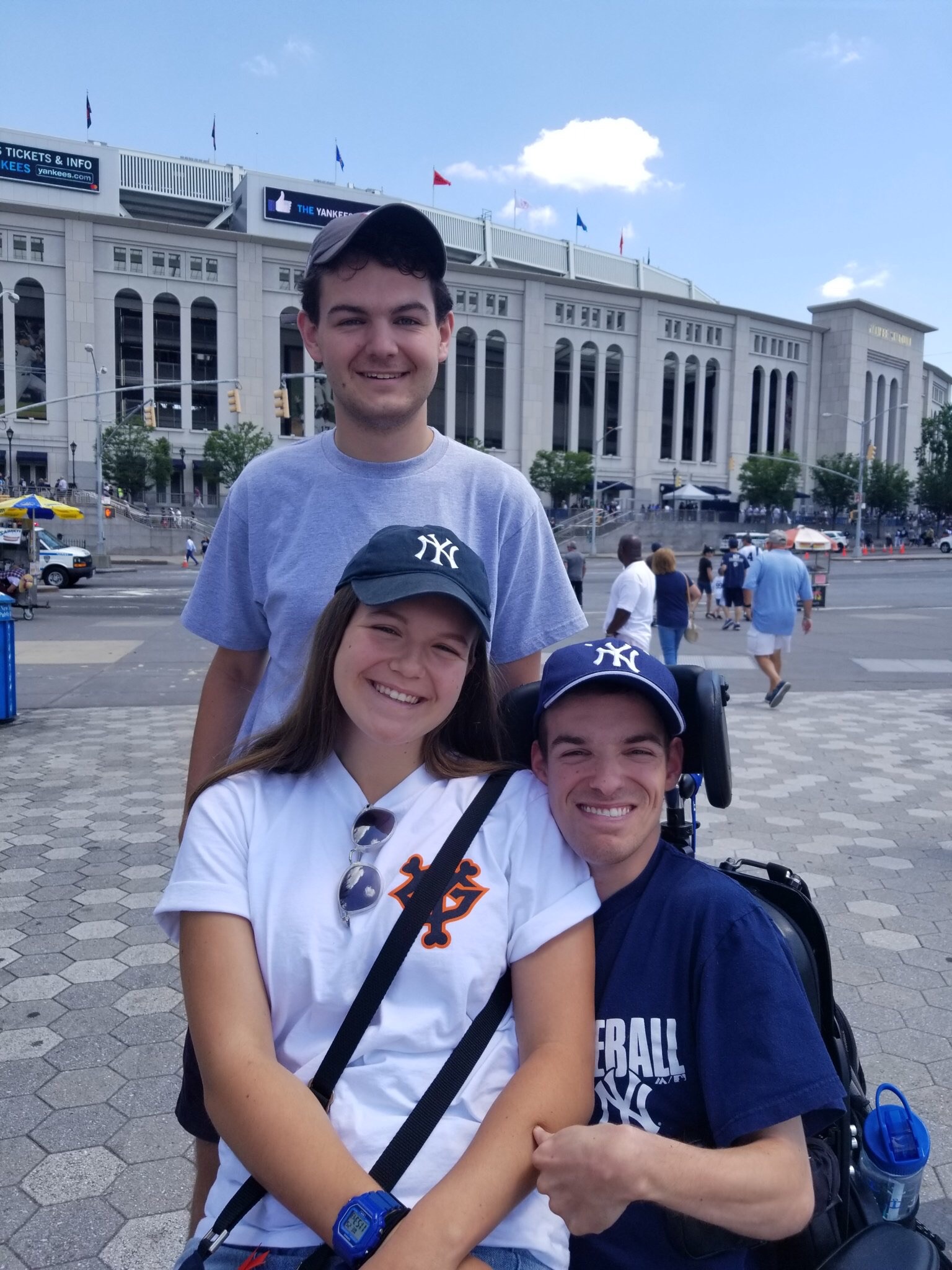Super Special Siblings

I've been thinking a lot lately about the incredible impact siblings of kids with special needs have on their brothers' and sisters' lives -- and how we can strengthen and celebrate that far beyond National Siblings Day (April 10).
While our son with CP, Andrew, clearly influences his sister and brother in important ways, they each play a huge role in helping him live his best life. And they have for years. For almost three decades, Ellen and Henry have been by Andrew's side -- applauding his accomplishments, toiling through his trials, supporting him physically and emotionally, and welcoming him into their worlds. Yes, they argue. But they also just have fun together, especially now that they're all adults.
I know countless sons and daughters like ours who love, support, befriend, and champion their disabled siblings. They're amazing for the impact they have on others, and they're exceptional in their own right just as human beings. I truly think they should be celebrated everyday, and I definitely believe we need to show and tell them more often how truly special they are.
Just like raising a complex kid isn't easy for parents, it's a constant challenge to be the sibling of someone with "special needs." Of course they learn through this adversity, but it often makes them overcompensate for their sibling's imperfections. Do they gain increased empathy? Sure. But this often goes hand-in-hand with increased worry. Every coin has it's flip side.
It strikes me as I age that Andrew's siblings now have almost more impact on his life than his father and I. The three of them text and call and consult with each other, share inside jokes, and plan visits that don't include us. Over time, Henry and Ellen have assumed increased legal and financial responsibilities to support Andrew long-term. As I type that last sentence, I'm struck by how much this matters -- especially since John and I won't be around forever. In families like ours, it's incredibly important that our kids continue to build supportive relationships with each other, and confidence in themselves. That they actually like each other as people in addition to loving each other as siblings.
Even in the most normal of sibling situations, this is a pretty tall order. Our neurotypical kids' lives include layers of additional challenge. They have a sixth sense that detects parental stress, fear, and exhaustion. They have fears for their futures, including what will be expected of them when parents are no longer in the picture. My adult children even worry about things like government programs, paperwork, and administrative tasks, which they've seen consume me over the years. I try to assure them that it's all manageable, but who really knows? Sibling concerns are real.
More often than we care to admit, these feelings are ignored and overlooked because even the best parents only have so much bandwidth. But "special needs" shouldn't take permanent priority over "regular needs." Siblings I've met tell me the worst thing a parent can do is leave them out of important conversations and planning. Instead, we must make them an integral part of decision-making by discussing and adjusting plans and expectations. This gives them agency and makes them feel seen, heard, and valued.
When parents intentionally invest time, energy, and resources into their neurotypical children, we strengthen the bond between siblings and lay vital groundwork for a more balanced, loving, and secure future for the entire family.
Let go of your guilt, which we all hold onto for different reasons. Enjoy and involve your kids. Nurture their relationships with each other. And remember...
"Teamwork makes the dream work," with siblings and with baseball.

Helpful Resources
In addition to the links above, here are some great resources to help you examine how your parenting impacts the lives of ALL your children, especially the neurotypical siblings of children with disabilities. These are excellent starting points to build community, brainstorm possibilities, share stories and strategies, and even just gain sibling perspective as your family matures and evolves:
-
Sibling Support Project (https://siblingsupport.org/sibshops/faqs-about-sibshops/): Offers Sibshops — fun, supportive workshops for siblings of kids with disabilities.
- Sibnet (https://siblingsupport.org/connect/sibnet/): The internet's oldest and largest online support community for adult siblings of people with disabilities.
-
Special Needs Siblings (https://specialneedssiblings.com): An advocacy group created by and for siblings of individuals with special needs, with online communities and storytelling platforms.
-
“Being the Other One" by Kate Strohm -- Insights and perspective from a counselor, educator, and sibling of someone with special needs.
- TedX talk by sister and adult sibling. Explains "parentification," pressing demands of taking care of a complex sibling, and wrestling with all the feelings. Raw and honest and full of important truth-telling.
-
Reddit's r/specialneeds and r/sibs: Online spaces for both parents and siblings to share experiences and support.
If you're aware of other sources for information and support, please share here. I love learning from others and promise to share broadly in a future newsletter.
Interested in learning more about working with Kris?
Contact us for information on what this might look like for you, including outcomes, availability, fees and more.
Stay connected with news and updates!
Sign up below to receive our newsletter and updates.
We hate SPAM. We will never sell your information, for any reason.


